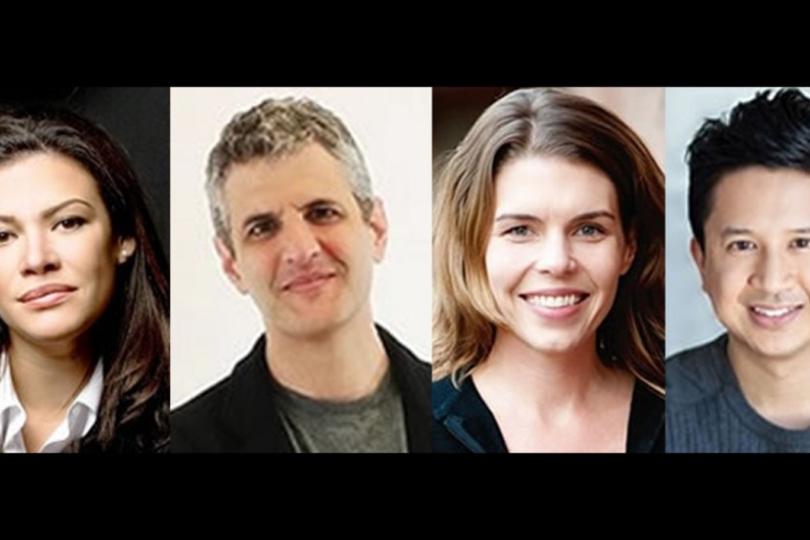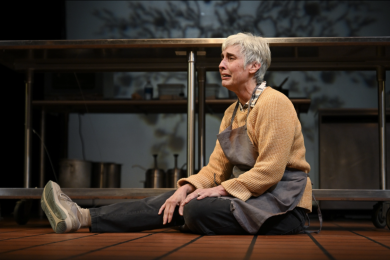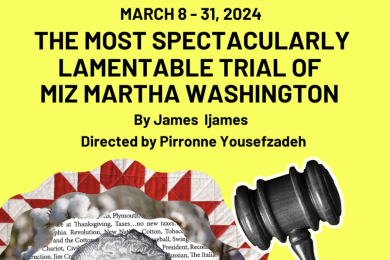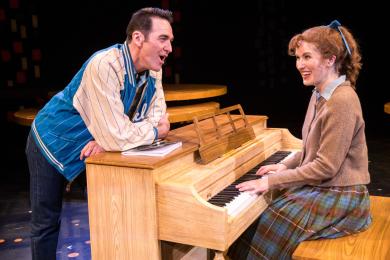Four Artistic Directors walk onto a stage. . .

When Canada’s new Prime Minister Justin Trudeau was asked why he nominated 15 women, two aboriginal people and three Sikhs to his 30-seat cabinet, he responded, “Because it’s 2015.”
The amount of media coverage he got for it was insane. It should be obvious that a government should be demographically representative of its citizens, and yet it is somehow still a radical act to put the theory of equality into practice. Reading about it was both heartwarming and frustrating – if a baseline level of equal representation is newsworthy, then when will we be able to make changes that are actually radical?
I had a similar reaction, on a different scale, to the “Re-Imagining Theatre” program put on by University of Minnesota’s Theater Arts & Dance Department on Friday night. The event brought together Sarah Bellamy, Joe Haj, Sarah Rasmussen, and Randy Reyes for a conversation about what it’s like to step into a large pair of shoes as the new Artistic Director of a well-established theater company. As the title suggests, the event was marketed as a way to address and celebrate the radical changes on the horizon as a result of their new leadership (of Penumbra, the Guthrie, the Jungle, and Mu Performing Arts, in case you really haven’t been paying attention over the past year).
To me, the biggest surprise of the evening was the fact that the talk managed to pull a large crowd on a Friday night. A fair chunk may have been UMN students fulfilling a requirement, but the vast majority of the audience seemed genuinely interested in what kinds of new innovations to expect from the four new ADs. However, while all of the guests had interesting, articulate visions for their companies’ futures, their messages generally boiled down to common sense, especially considering the increasingly diverse landscape of the Twin Cities of 2015.
My fairly tepid impression of the event was partly due to moderator Marianne Combs of MPR, who mostly stuck to softball questions: a kind of extended-job-interview meets undergraduate mentorship program. The guests got to weigh in on such scintillating topics as how to get oriented as a new Artistic Director (answer: schmooze, schmooze, schmooze, and drink lots of coffee), as well as the most crucial skills they need for their new jobs (answer: be a decent and intelligent human being).
Who are you really?
There were, however, moments when the guests were able to let their personalities and visions shine through more. In response to a question about theater’s responsibility to address issues within the local community, Randy Reyes spoke about picking up on the social justice side of theater only after discovering that his physical appearance affected the kind of work he could get. The challenge for Mu has been giving a voice to Asian-Americans who are too often seen as the invisible model minority; Sarah Bellamy, on the other hand, spoke of Penumbra’s struggles to combat the legacy of minstrelsy and the resulting mistrust of theater among members of the Black community.
While Reyes and Bellamy are in the trenches dealing directly with politics of identity and representation, Joe Haj responded to the social justice question with a reference to Aeschylus’s The Persians, the oldest surviving piece of Greek drama. In a very engagingly professorial way, Haj described it as an anti-war play that established Western classical theater as rooted in questions about human rights. Although Haj (and, by extension, the Guthrie) had a somewhat ivory tower air about him, he also had a very realistic sense of what the Guthrie’s limitations and potential could be. Likening the Guthrie to a large ship that takes a long time to change course, Haj expressed the desire to explore how the company can become more responsive to the political moment – which, while not radical, is probably just about as much common-sense optimism as you can get when it comes to the Guthrie.
At the Jungle, Sarah Rasmussen is just about to embark on her first season as the new AD, but she was committed – both in the discussion, and in her 2016 season programming – to the idea of staging poetic plays that ask good questions in structurally rich ways, while attending to questions about whose voices are being heard. In this generally feel-good program, Rasmussen also provided the most direct criticism of theater professionals, arguing that theater companies are generally not good at communicating their artistic visions, and they need to get better at letting audiences know why they’re choosing to tell certain stories at a certain moment.
What are your challenges?
That’s a great critique, but radical it is not. The most provocative issues were raised, as one might expect, by Sarah Bellamy and Randy Reyes, both of whom evoked the challenges in building a donor base within their respective communities. Bellamy noted that because the Black community tends to support theater only after causes like education and social services, individuals with money to spare often donate to larger institutions than Penumbra to gain social capital and networking opportunities. And in the Asian-American community, Reyes remarked, there is not much of a culture of philanthropy at all.
As with many things, it all goes back to the money. And so the conversation turned to how companies get people in the door, with Haj bemoaning the Guthrie’s struggle to keep financially afloat enough to stage plays that don’t attract large audiences. Again, this was where Bellamy’s and Reyes’s experiences contrasted most sharply with those of Haj and Rasmussen. Reyes observed that since the biggest box office sellers for Mu also cost more money to produce, Mu loses the same amount of money whether it stages a big musical or a local premiere – so it might as well put on shows like “Purple Cloud,” a world premiere written by a local writer who identifies as “hapa” (half one race, half another). Bellamy made the critical distinction between “plays with Black people” and social justice-oriented “Black theater,” arguing that (perhaps unlike the Guthrie) Penumbra’s audiences seek out and appreciate challenging and occasionally uncomfortable theatrical experiences.
Although the program didn’t delve as deeply into structural issues as it could have, all four Artistic Directors appear to be asking the right questions of their performers, their stakeholders, and their communities. They are also fighting different fights, with Bellamy busy advocating for a diversified theater landscape where artists’ voices can be heard without being “mediated or translated,” while Haj argues for the necessity of theater in a “narrowcast” world, describing it as a “radical act to turn off devices and sit in someone else’s story.”
It felt good to hear that the leaders of such prominent companies have their hearts in the right place. But I can’t really say the program qualified as “re-imagining theatre.” It’s 2015: addressing structural issues involving parity and inclusion should just be common sense.




